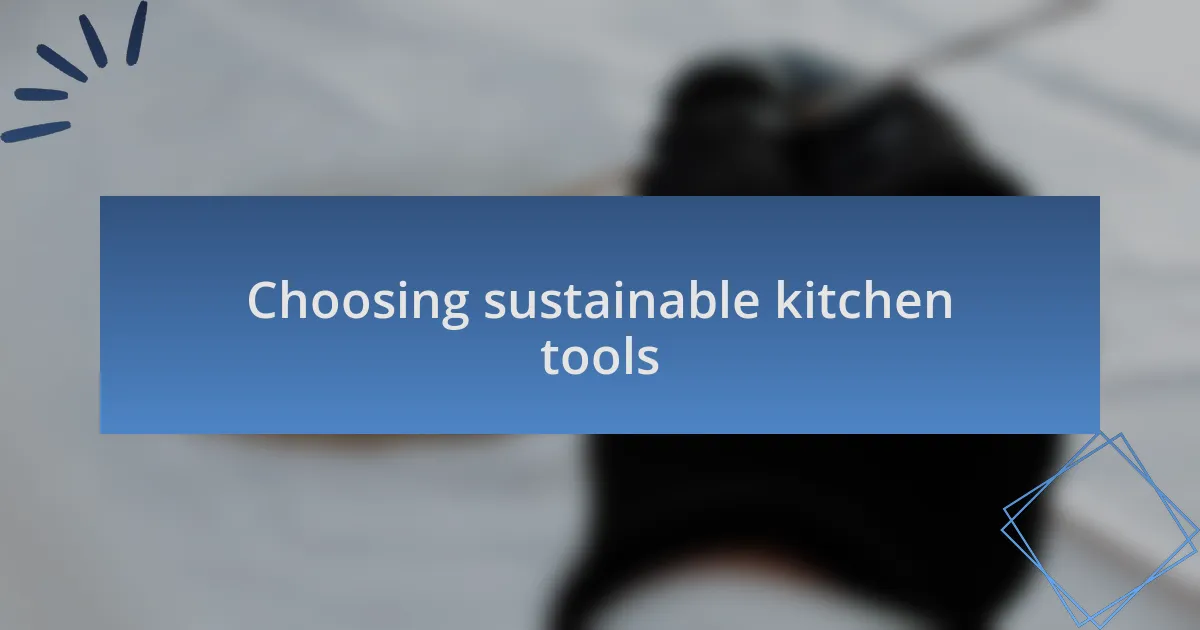Key takeaways:
- Handcrafted goods embody the artisan’s passion and skill, fostering a connection between consumers and their communities.
- Reducing plastic in the kitchen enhances both health and environmental responsibility, leading to a more mindful lifestyle.
- Choosing sustainable kitchen tools, such as bamboo and glass, not only minimizes waste but also creates a deeper appreciation for craftsmanship.
- Incorporating handmade items transforms the kitchen experience, encouraging curiosity about the stories behind each piece.

Understanding handcrafted goods
Handcrafted goods hold a special place in our lives because they reflect the passion and skill of the artisan. I remember purchasing a hand-thrown ceramic bowl from a local artist, and every time I use it, I can feel the love and energy that went into its creation. Isn’t it amazing how an object can tell a story through its imperfections and unique character?
These products are often created with sustainable practices and materials, making them not just beautiful but also environmentally friendly. When I switched to handcrafted kitchen items, I was surprised at how often they sparked conversations with friends and family. Have you ever experienced that moment when someone admires a handcrafted piece, which opens up a deeper discussion about its origin and the maker’s intent?
Moreover, the connection between handcrafted goods and community is profound. Supporting local artisans means investing in the rich tapestry of traditions and cultures. I find joy in knowing that my purchases empower someone within my community to continue their craft. It makes you wonder—how many stories are woven into the fabric of the products we choose for our homes?

Benefits of reducing plastic
Reducing plastic in my kitchen has brought about a surprising sense of peace. When I eliminated plastic containers, I replaced them with glass and metal alternatives, and now my kitchen feels fresher and less cluttered. Isn’t it fascinating how a simple change in materials can shift the entire atmosphere of a space?
Another benefit is the positive impact on my health. By minimizing plastic, I’ve become more aware of what I’m storing and using in my kitchen. I remember the first time I used a beeswax wrap instead of plastic wrap; it felt like a small victory for my well-being, knowing I was avoiding harmful chemicals that could leach into my food.
Finally, there’s a rewarding sense of responsibility in reducing plastic waste. Each time I refuse a plastic bag or choose a handcrafted solution, I feel I’m taking a stand, albeit small, against pollution. Have you ever felt that rush of satisfaction from making a mindful choice? It’s empowering to know that my kitchen can be a part of a bigger solution for our planet.

Choosing sustainable kitchen tools
When I began my journey towards a more sustainable kitchen, choosing the right tools felt like an adventure. I opted for bamboo utensils and stainless steel measuring cups, and I was amazed at how beautifully they complemented my kitchen’s aesthetic. Have you noticed how using natural materials can make cooking feel more intentional and enjoyable?
One of my most treasured finds has been a handmade wooden cutting board. The texture and warmth of the wood add a certain charm to my kitchen, and I find myself taking extra care of it, almost as if it’s a cherished family heirloom. Isn’t it incredible how these handcrafted items create a deeper connection to the food we prepare and the environment we inhabit?
Investing in sustainable kitchen tools doesn’t just minimize waste; it cultivates a mindset of mindfulness and appreciation. Each time I reach for my glass storage containers instead of plastic, I find myself reflecting on the importance of simplicity. Isn’t it time we celebrate the craftsmanship behind our everyday items, knowing that they not only serve a purpose but also tell a story?

Incorporating handmade items
Handmade items have a unique way of transforming the ambiance of my kitchen. I remember the first time I brought home a set of ceramic bowls crafted by a local artisan. Their vibrant colors and unique glazes sparked joy in my heart each time I used them. Have you ever noticed how the small details in our kitchen can elevate the everyday experience of cooking and sharing meals?
I’ve also incorporated handwoven baskets into my kitchen for storing fruits and vegetables. They not only look appealing but also serve a practical purpose. Each time I reach for a fresh apple, I’m reminded of the skill and time invested in creating that basket. It fosters a sense of connection to the food I eat, doesn’t it?
Switching to handcrafted kitchen items encourages me to consider sustainability at a deeper level. For instance, I often find myself wondering about the story behind my hand-thrown mugs. Who made them? What inspired their design? This sense of curiosity enhances my kitchen experience and reminds me that each piece is more than just an object; it’s a connection to the hands that created it.

Sharing my personal journey
As I embarked on my journey to minimize plastic in my kitchen, I found myself diving deep into the world of sustainable alternatives. I vividly recall the day I decided to swap out my plastic cutting boards for a beautifully crafted bamboo board. The feel of the smooth surface and the faint scent of the wood transformed my meal prep into a more mindful activity. Have you ever considered how such a simple change can shift your perspective on cooking?
One afternoon, while rummaging through my drawers, I stumbled across a collection of mismatched glass jars I had accumulated over the years. Instead of tossing them aside, I repurposed them for storage, filling them with grains and spices. Watching the colorful contents layer in each jar brought a sense of order and inspiration to my kitchen. It’s surprising how a little creativity can breathe new life into items we often overlook, right?
Reflecting on this journey, I realize the emotional impact it has had on my daily life. Every time I reach for a glass jar or my bamboo cutting board, I feel proud of the conscious choices I’ve made. It’s more than just eliminating plastic; it’s about embracing a lifestyle that resonates with my values. Isn’t it fascinating how each small step can lead us closer to a more sustainable and fulfilling way of living?